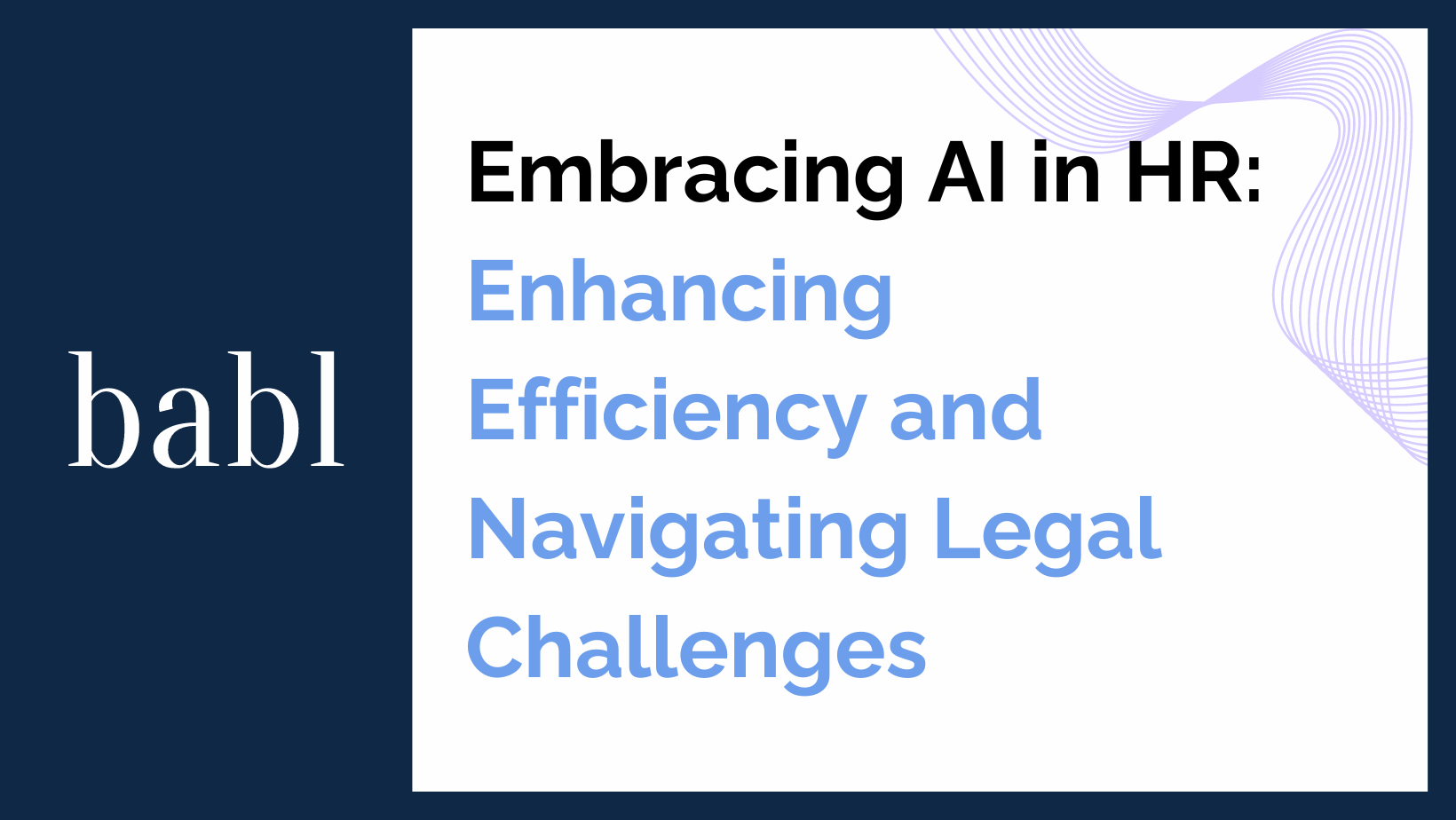AI in HR: Enhancing Efficiency and Navigating Legal Challenges
Artificial Intelligence (AI) is revolutionizing the human resources (HR) landscape, offering unprecedented capabilities in automating and enhancing processes, particularly in hiring and promotions. This transformative technology not only streamlines operations but also introduces complex legal challenges that organizations must navigate. While AI is reshaping HR practices, it brings with it a list of benefits and risks.
Introduction to AI in Human Resources
AI in HR refers to the application of artificial intelligence technologies, including machine learning, natural language processing, and robotics, to automate and improve HR tasks. This technology is increasingly employed in various HR functions such as recruitment, onboarding, employee engagement, performance evaluation, and promotions.
Leveraging AI: Opportunities for Transformation
Recruitment and Selection: AI is significantly transforming the recruitment process. Tools such as AI-driven applicant tracking systems (ATS) can parse and analyze resumes at incredible speeds, helping HR departments filter through thousands of applications to identify the most suitable candidates efficiently. AI-powered chatbots can engage potential hires, answer their queries, and schedule interviews, enhancing the candidate experience and reducing administrative burdens.
Employee Onboarding and Training: AI streamlines the onboarding process by automating routine tasks such as filling out employment forms and scheduling introductory sessions. This allows HR professionals to focus on creating a more engaging and personalized onboarding experience for new employees.
Performance Management: AI systems help monitor employee performance by analyzing job-related data and providing actionable insights. This assists managers in making data-driven decisions about promotions and professional development opportunities.
Employee Engagement and Retention: AI tools analyze employee feedback and behavior patterns to predict turnover risks and suggest interventions to improve engagement and retention rates.
Navigating the Legal Landscape
As AI becomes more embedded in HR processes, it raises significant legal considerations related to privacy, discrimination, and employment law:
- Data Privacy Concerns: The use of AI involves the processing of large amounts of personal data, including sensitive information. Compliance with data protection regulations such as the GDPR in the EU or CCPA in California is critical to protect employee privacy and avoid hefty penalties.
- Discrimination and Bias: AI systems can inadvertently learn and perpetuate biases present in historical data or algorithms. This poses risks of discriminatory practices, especially in hiring and promotions, potentially violating laws like the U.S. Civil Rights Act or the UK Equality Act. Ensuring that AI tools are transparent and their decisions justifiable is crucial for legal compliance.
- Compliance with Employment Laws: AI-driven decisions in HR must align with employment laws concerning hiring practices, promotions, terminations, and worker rights. Misclassifications or unfair dismissals influenced by AI could lead to legal challenges and reputational damage.
Addressing the Risks: AI Audits and Legal Compliance
To mitigate the risks associated with AI, organizations are increasingly turning to AI audits. These audits assess AI tools for biases, effectiveness, and compliance with relevant laws. For example, New York City’s Local Law 144 mandates annual audits for Automated Employment Decision Tools (AEDTs) used in hiring to ensure they do not discriminate against protected classes.
Implementing AI: Best Practices for Success
To leverage AI effectively while navigating the legal landscape, organizations should adopt the following best practices:
- Develop Ethical AI Guidelines: Develop and adhere to ethical guidelines for AI use in HR, ensuring that AI decisions are fair, transparent, and accountable.
- Conduct Regular AI Audits: Conduct regular audits of AI systems to check for biases, effectiveness, and compliance with all applicable laws.
- Foster Employee Involvement: Involve employees in the deployment of AI systems and provide training to help them understand how AI tools impact their work and rights.
- Collaborate with Legal Experts: Work closely with legal professionals to ensure that AI applications comply with all current and emerging regulations affecting HR practices.
- Monitor and Adapt: Implement mechanisms to monitor the performance of AI tools continuously and collect feedback from users to improve their accuracy and fairness.
The Need for Human Oversight in Human Resources
To ensure that AI is not only effective but also ethically sound, human oversight is essential. While AI systems can process data and make decisions at incredible speeds, they lack the nuanced understanding and ethical considerations that humans bring to the table. Human oversight acts as a safeguard, ensuring that AI-driven decisions are aligned with organizational values and legal standards. This oversight is crucial for identifying and correcting biases, making context-sensitive decisions, and maintaining accountability in AI-driven processes. By incorporating regular human review into AI systems, organizations can strike a balance between automation and ethical responsibility, ensuring that technology serves to enhance, rather than undermine, fairness and equity in HR practices.
The Future
AI is a powerful tool that, when used responsibly and in compliance with legal standards, can transform organizational practices for the better. However, as the technology advances, so too must our approaches to managing its ethical and legal implications. Organizations that stay informed and proactive in addressing these challenges will be best positioned to reap the benefits of AI while maintaining trust and compliance.
Need Help?
If you’re wondering how to navigate AI regulations around the world, don’t hesitate to reach out to BABL AI. Their Audit Experts are ready to provide valuable assistance while answering your questions and concerns.





